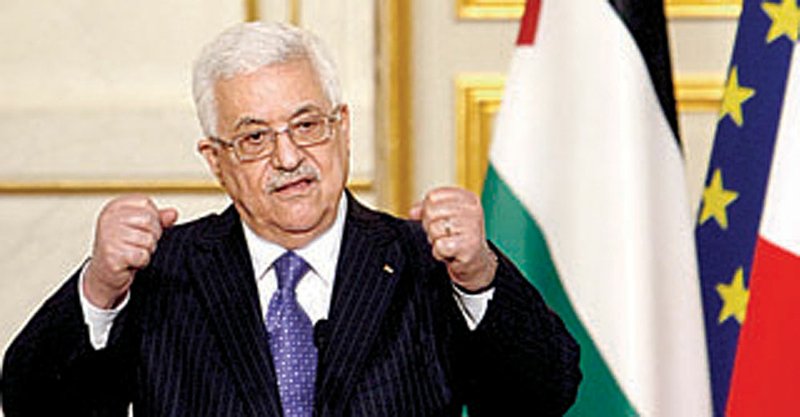JERUSALEM — The Palestinian president said Monday that he would wait at least a week before deciding whether to quit Mideast peace talks, giving U.S. mediators time to broker a compromise after Israel refused to extend its 10-month moratorium on new West Bank settlement construction.
President Mahmoud Abbas has repeatedly threatened to withdraw from the newly launched negotiations if Israel resumes building in the settlements. But with the stakes so high, Abbas said during a visit to Paris that he would not make any hasty decisions. He said he would consult with the Palestinian leadership before discussing the matter with representatives of the 22-member Arab League next Monday.
“We will not have any quick reactions,” he said at a news conference standing beside French President Nicolas Sarkozy. “After this chain of meetings, we will be able to put out a position that clarifies the Palestinian and Arab opinion on this issue now that Israel has refused to freeze settlements.”
A senior Palestinian official said the Palestine Liberation Organization’s 18-member decision-making body would meet Wednesday or Thursday to determine how to proceed. He was speaking on condition of anonymity because he was discussing internal Palestinian deliberations.
The construction restrictions that the Israeli government ordered expired at midnight Sunday with no sign Israel was heeding U.S. and Palestinian pressure to keep the curbs in place.
That threw the peace talks, which only restarted three weeks ago, into doubt. But the Americans said they were still working with Israeli and Palestinian negotiators to find a formula that would keep the negotiations alive.
Abbas on Monday urged Israel to extend the settlement slowdown for three or four more months to allow for a discussion of “fundamental issues” in negotiations.
In Cairo, an Arab League official said Arab foreign ministers were expected to endorse whatever position Abbas took. He spoke on condition of anonymity because no decision had been made.
Immediately after the restrictions expired at midnight, Israeli Prime Minister Benjamin Netanyahu appealed to Abbas to keep negotiating.
Israeli Deputy Prime Minister Silvan Shalom appealed to the Palestinians to keep talking. “I think if they continue to negotiate with us, we can finally reach an agreement,” he said, expressing regret that the talks did not resume earlier in the 10-month settlement slowdown period.
In Washington, the State Department said envoy George Mitchell would return to the region today for talks with Israeli and Palestinian leaders - presumably part of the effort to find a compromise formula over the settlement issue.
U.N. Secretary-General Ban Ki-moon reminded Israel on Monday that the building of settlements on occupied territory was illegal, and said he was “disappointed” by the government’s failure to extend its partial ban on further West Bank construction.
Ban reiterated that “settlement activity is illegal under international law,” and urged the Jewish state to fulfill its obligation to freeze further construction.
On Monday, there was only a smattering of construction in different settlements across the West Bank.
In Adam, north of Jerusalem, contractors surveyed building plans for new housing as a bulldozer cleared away earth. Another patch of land was prepared by a lone bulldozer in Karmei Tzur, in the southern West Bank, while four construction vehicles worked on leveling a rock and shrub covered plot in Ariel, a large settlement in the northern West Bank, to make the way for 100 homes planned in the area.
Palestinians regard settlements as a major obstacle to peace because the construction is on land they claim for part of their future state. Some 300,000 Israeli settlers live in communities scattered across the West Bank, in addition to 180,000 Jewish Israelis living in east Jerusalem, the area of the holy city claimed by the Palestinians as their capital.
Israeli Foreign Minister Avigdor Lieberman accused the Palestinians of seeking to undermine the negotiations, saying they had been forced into taking part by American pressure.
“We decided about the moratorium 10 months ago as a unilateral gesture of goodwill toward the Palestinians. During those 9 months the Palestinians wasted time and completely refused to accept this gesture and accused Israel that it’s a fraud, that it’s not serious,” he said.
Meanwhile, a small boat carrying Jewish activists is on course to arrive in the blockaded Gaza Strip late this morning, though they consider it likely the Israeli navy will stop them, an activist on board told The Associated Press on Monday.
The Irene set sail from Cyprus on Sunday, carrying nine Jewish activists from Israel and other countries. They said they are trying to draw attention to Israel’s blockade of Gaza and will not resist if they are stopped.
Organizers have said they expect the Israeli navy to overtake the boat as it gets closer to Gaza, possibly as early at Monday evening.
The Israeli military declined to comment.
Information for this article was contributed by Matthew Lee, Ben Hubbard and Slobodan Lekic of The Associated Press.
Front Section, Pages 4 on 09/28/2010
